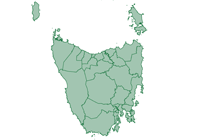The location quotient is a simple way of seeing which are the main industries in an area, relative to the wider region. LQ shows the percentage of the local economy characteristic (eg. employment, value add) in a particular industry divided by the percentage of the wider area (region, state, nation) that this industry makes up.
- Where LQ=1, that industry is exactly as prevalent as in the wider region.
- A LQ greater than 1.2 indicates a significant specialisation of the industry in the local area – possibly a key economic strength. Higher numbers mean greater specialisations. Anything over 2 is a major specialisation.
- A LQ between 0.8 and 1.2 means the industry is broadly similar in importance in the local area compared to the comparison region and could be seen as representative.
- An LQ under 0.8 indicates an industry which is more important in the region than the local area, and may represent an economic weakness or opportunity for growth.
LQs should be analysed in combination with the proportional economic share that industry represents. For example, an industry with an LQ of 2 reveals a specialisation but if that industry only represents 3% of the local economy, it may not be significant. Compare with the figures on the Employment by industry (Total), Employment by industry (FTE), Value added pages for this context. National Economics (NIEIR) - Modelled series
Data source
National Economics (NIEIR) - Modelled series
Current area:
Current benchmark:
Measure
Comparison year:
| Location quotient | |||||||||
|---|---|---|---|---|---|---|---|---|---|
| Tasmania - Employment (Total) | 2022/23 | 2008/09 | Change | ||||||
| Industry (Click rows to view sub-categories) | % | Greater Hobart% | Location Quotient Greater Hobart | % | Greater Hobart% | Location Quotien Greater Hobart | 2022/23 - 2008/09 | ||
| Agriculture, Forestry and Fishing | 5.3 | 1.7 | 3.12 | 6.0 | 1.6 | 3.64 | -0.14 | ||
| Mining | 2.4 | 0.7 | 3.39 | 2.2 | 0.5 | 4.61 | -0.26 | ||
| Manufacturing | 7.0 | 5.3 | 1.31 | 9.4 | 7.4 | 1.28 | +0.03 | ||
| Electricity, Gas, Water and Waste Services | 2.0 | 2.4 | 0.83 | 1.6 | 2.0 | 0.77 | +0.08 | ||
| Construction | 8.2 | 8.6 | 0.95 | 8.2 | 8.6 | 0.96 | -0.01 | ||
| Wholesale Trade | 2.2 | 1.8 | 1.26 | 3.7 | 3.1 | 1.18 | +0.07 | ||
| Retail Trade | 9.3 | 9.5 | 0.99 | 11.1 | 11.3 | 0.98 | +0.01 | ||
| Accommodation and Food Services | 7.2 | 7.1 | 1.02 | 6.9 | 6.8 | 1.01 | +0.01 | ||
| Transport, Postal and Warehousing | 4.6 | 3.9 | 1.17 | 4.6 | 4.0 | 1.16 | +0.00 | ||
| Information Media and Telecommunications | 1.3 | 1.7 | 0.78 | 1.8 | 2.5 | 0.73 | +0.07 | ||
| Financial and Insurance Services | 2.1 | 2.6 | 0.82 | 2.5 | 3.0 | 0.85 | -0.03 | ||
| Rental, Hiring and Real Estate Services | 1.2 | 1.2 | 1.06 | 1.4 | 1.7 | 0.87 | +0.23 | ||
| Professional, Scientific and Technical Services | 5.8 | 7.5 | 0.77 | 4.5 | 6.0 | 0.75 | +0.03 | ||
| Administrative and Support Services | 2.6 | 2.6 | 1.02 | 2.6 | 2.4 | 1.07 | -0.05 | ||
| Public Administration and Safety | 7.0 | 9.8 | 0.71 | 8.3 | 11.7 | 0.71 | +0.00 | ||
| Education and Training | 9.6 | 10.6 | 0.91 | 8.2 | 8.7 | 0.95 | -0.04 | ||
| Health Care and Social Assistance | 16.7 | 17.3 | 0.97 | 11.6 | 12.8 | 0.91 | +0.07 | ||
| Arts and Recreation Services | 1.8 | 2.3 | 0.79 | 1.8 | 2.3 | 0.78 | +0.02 | ||
| Other Services | 3.6 | 3.6 | 1.01 | 3.5 | 3.6 | 0.96 | +0.04 | ||
| Total Industries | 100 | 100 | 1.00 | 100 | 100 | +1.00 | 0 | ||
Source: National Institute of Economic and Industry Research (NIEIR) ©2024. ©2023. Compiled and presented in economy.id by .id (informed decisions). NIEIR-ID data are adjusted each year, using updated employment estimates. Each release may change previous years’ figures. Learn more | |||||||||


Dominant groups
A location quotient of greater than 1.2 is generally considered a level of industry specialisation, while a LQ of 0.8 or less indicates an industry which doesn’t have a major presence in the area.
An analysis of employment (total) in Tasmania in 2022/23 shows the three industries with the highest location quotient relative to Greater Hobart were:
- Mining (3.4 )
- Agriculture, Forestry and Fishing (3.1 )
- Manufacturing (1.3 )
The three industries with the lowest location quotient relative to Greater Hobart were:
- Information Media and Telecommunications (0.8 )
- Professional, Scientific and Technical Services (0.8 )
- Public Administration and Safety (0.7 )
Emerging groups
Changes in location quotients over time reveal emerging or declining industry specialisations.
The largest changes in the employment (total) LQ between 2008/09 and 2022/23 in Tasmania were for these industries:
- Mining (-0.3)
- Rental, Hiring and Real Estate Services (+0.2)
- Agriculture, Forestry and Fishing (-0.1)
- Electricity, Gas, Water and Waste Services (+0.1)
